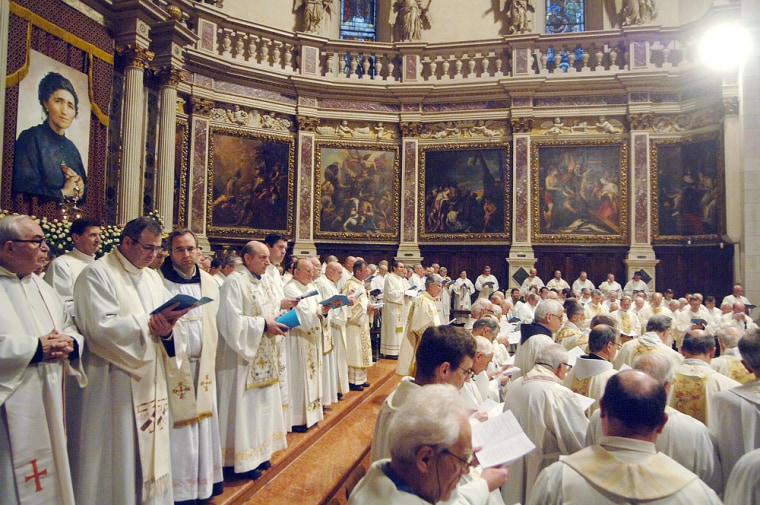ROME — It’s an enduring image — the extended Italian family crowding around a dining-room table piled with food and wine, surrounded by nieces, nephews, cousins and screaming children.
Trouble is, it is no longer a widespread reality. Nowadays it takes a Christmas or Easter holiday to gather a crowd in the average Italian household, and the result is a lot more like Thanksgiving dinner in “Everybody Loves Raymond” than the 4th of July barbecue at Tony Soprano’s.
The plain fact is that Italians just are not having children, a situation the Roman Catholic Church, headquartered in an enclave in this capital city, sees as something of a crisis.
Pope Benedict XVI brought attention to the issue with the beatification — a major step toward sainthood — of a woman known as “Mamma Rosa,” who lived in the early 20th century and raised 11 kids. She married a widower with two small children, then gave birth to nine children of her own (and also took in four others).
But while the pope praises couples who choose to have several children, most Italian families limit themselves to one.
And although for the first time in 15 years the birth rate here has increased instead of declining — a mere three tenths of one percent — the pope’s pleas have revived the question of why Italians have so few children.
Church and society divided
Part of it has to do with the fact that Italian society no longer marches in lockstep with the Vatican.
In Roman pharmacies and grocery stores adjacent to the Vatican, for instance, racks of condoms are prominently placed next to the cash registers. Italians buy them unabashedly, despite the frowns of the Catholic hierarchy.
But while such a phenomenon demonstrates the cliché of the “Latin lover,” statistics reveal the other side of the Italian male — as a “mamma’s boy.”
The latest report from ISTAT, the Italian Statistical Institute, shows that 40 percent of Italian men between the age of 30 and 34 still live with their parents.
There are multiple reasons: stagnant incomes, lack of affordable housing, education and employment.
But those don’t address the cultural and psychological factors which have an even greater sway on this trend: the fact that it is socially OK for a grown man to live with his mother.
Whereas Anglo-American society often views an adult male living at home as being somewhat peculiar or inadequate, Italians think it’s absolutely normal.
Many of the guys who do live at home pay lip service to their wish for independence, but privately admit that they enjoy the best of both worlds.
They feel free to frolic sexually and take frequent vacations abroad, but enjoy coming home to a doting mother, to find their favorite meals on the table and their fashionable clothing cleaned, pressed and hanging in the closet.
A lot of these thirty-somethings have good jobs, but because the average Italian salary is not very high, they would have very little disposable income left over if they had to maintain their own home and pay their own bills.
Living at home they tend to contribute little or nothing, and are free to spend heavily on cars, clothes, cigarettes, cell phones, discos and dating.
Conflicts with the Vatican’s view
Needless to say, the Roman Catholic Church is very unhappy with this picture.
The pope recently called on governments to do more to encourage and support parents who chose to have more kids. Benedict’s efforts are widely reported in the media here, but his words aren’t stirring the population.
There were 10,000 fewer marriages in 2004 than in 2003, for a total of 250,000. In a country of 58 million people, that’s not very many.
And not only are more Italian men choosing to live with their significant others rather than to marry, but they are also becoming fathers at an older age than in any other country in the world.
The average age of the father of a first child here is now 33, and the report also notes that when 35 year olds marry they are 80 percent less likely to want to have children than men who get married at 25.
These numbers reflect a society that is becoming more and more secular, less religious, and more self-centered.
And the fewer the children, the more Italian mothers seem to cling to them for as long as they can.
